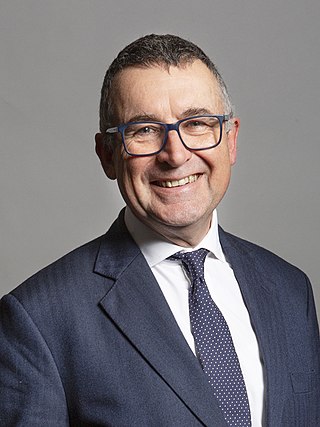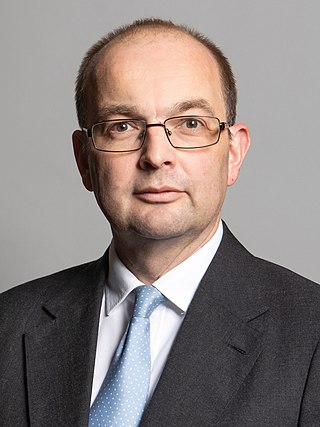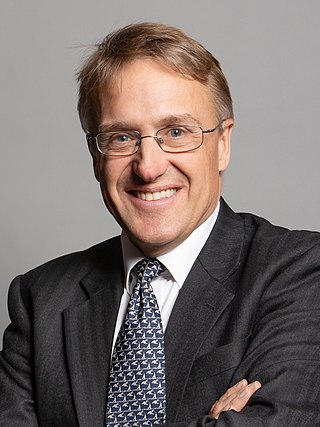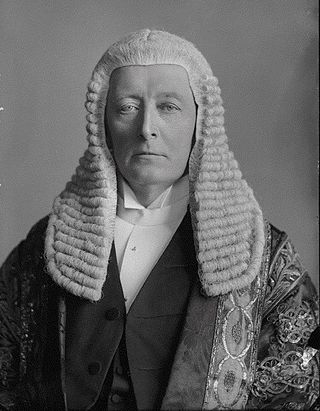
The Speaker of the House of Commons is the presiding officer of the House of Commons, the lower house and primary chamber of the Parliament of the United Kingdom. The current speaker, Lindsay Hoyle, was elected Speaker on 4 November 2019, following the retirement of John Bercow. Hoyle began his first full parliamentary term in the role on 17 December 2019, having been unanimously re-elected after the 2019 general election.

The speaker of the Australian House of Representatives is the presiding officer of the Australian House of Representatives, the lower house of the Parliament of Australia. The counterpart in the upper house is the president of the Senate. The office of the speakership was established in 1901 by section 35 of the Constitution of Australia. The primary responsibilities of the office is to oversee house debates, determine which members may speak, maintain order and the parliamentary and ministerial codes of conduct during sessions and uphold all rules and standing orders. The current speaker of the House of Representatives is Milton Dick, who was elected on 26 July 2022.
The 1922 Committee, formally known as the Conservative Private Members' Committee, or sometimes simply the 22, is the parliamentary group of the Conservative Party in the British House of Commons. The committee, consisting of all Conservative backbench Members of Parliament (MPs), meets weekly while Parliament is in session and provides a way for backbenchers to co-ordinate and discuss their views independently of frontbenchers. Its executive membership and officers are by consensus limited to backbench MPs; however, since 2010, frontbench Conservative MPs have an open invitation to attend meetings.

William Shepherd Morrison, 1st Viscount Dunrossil,, was a British politician. He was a long-serving cabinet minister before serving as Speaker of the House of Commons from 1951 to 1959. He was then appointed as the 14th Governor-General of Australia, in office from 1960 until his death in 1961.

Sir Billy Mackie Snedden, was an Australian politician who served as the leader of the Liberal Party from 1972 to 1975. He was also a cabinet minister from 1964 to 1972, and Speaker of the House of Representatives from 1976 to 1983.

Sir Bernard Christison Jenkin is a British Conservative Party politician who has been the Member of Parliament (MP) for Harwich and North Essex, previously Colchester North then North Essex, since 1992. He also served as chair of the Liaison Committee.

Sir Lindsay Harvey Hoyle is a British politician who has served as Speaker of the House of Commons since 2019 and as Member of Parliament (MP) for Chorley since 1997. Before his election as speaker, he was a member of the Labour Party.
James Milner, 1st Baron Milner of Leeds,, was a British Labour Party politician.

Sir James Philip Duddridge, is a British politician and former banker. A member of the Conservative Party, he served as the Member of Parliament (MP) for Rochford and Southend East from 2005 to 2024. Duddridge previously held several ministerial positions under prime ministers David Cameron, Boris Johnson and Liz Truss.

Sir Charles Ashley Rupert Walker is a British politician who served as chair of the House of Commons Procedure Committee from 2012 to 2019. A member of the Conservative Party, he was the Member of Parliament (MP) for Broxbourne in Hertfordshire from 2005 to 2024.
Sir Gordon Cosmo Touche, 1st Baronet was a British barrister and politician who served as a Conservative Member of Parliament (MP) for more than 30 years and became Deputy Speaker of the House of Commons. However, his conduct in this role was criticised by Labour MPs on several occasions.

The Speaker of the New South Wales Legislative Assembly is the presiding officer of the Legislative Assembly, New South Wales's lower chamber of Parliament. The current Speaker is Greg Piper, who was elected on 9 May 2023.

The 2009 election of the Speaker of the House of Commons occurred on 22 June 2009 following the resignation of Michael Martin as Speaker during the parliamentary expenses scandal. Martin was the first Speaker since Sir John Trevor in 1695 to be forced out of office. It was the first Speaker election since 11 May 2005, and the first contested election of a Speaker since 23 October 2000.
The 2000 election of the Speaker of the House of Commons occurred on 23 October 2000 following the retirement of Betty Boothroyd as Speaker. The election resulted in the election of Labour MP Michael Martin, who had served as Deputy Speaker since 1997. It was the first contested election since 27 April 1992.

The 1992 election of the Speaker of the House of Commons occurred on 27 April 1992, in the first sitting of the House of Commons following the 1992 general election and the retirement of the previous Speaker Bernard Weatherill. The election resulted in the election of Labour MP Betty Boothroyd, one of Weatherill's deputies, who was the first woman to become Speaker. This was at a time when the Conservative Party had a majority in the House of Commons. It was also the first contested election since William Morrison defeated Major James Milner on 31 October 1951, although Geoffrey de Freitas had been nominated against his wishes in the 1971 election.

The 1971 election of the Speaker of the House of Commons occurred on 12 January 1971, following the retirement of the previous Speaker Horace King. The election resulted in the election of Conservative MP Selwyn Lloyd, formerly Chancellor of the Exchequer and Foreign Secretary. It was the first election with more than one nominee since William Morrison defeated Major James Milner in the 1951 election.

The 1895 election of the Speaker of the House of Commons occurred on 10 April 1895, following the retirement of the previous Speaker Arthur Wellesley Peel. The election resulted in the election of Liberal MP William Court Gully by the narrow margin of 11 votes. It was the first contested Speaker election since 27 May 1839. The next contested election would not be for another 56 years, until 31 October 1951.

The election for the 158th Speaker of the House of Commons took place on 4 November 2019. Lindsay Hoyle was elected with 325 votes in the final ballot, out of a total of 540 votes cast.

The 1833 election of the Speaker of the House of Commons occurred on 29 January 1833.

The 1835 election of the Speaker of the House of Commons occurred on 19 February 1835.

















